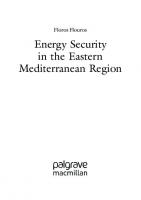Transnational Security Cooperation in the Mediterranean 3030544435, 9783030544430
This volume draws together academics and think tank experts to explore the revised European Neighborhood Policy (ENP) an
286 27 3MB
English Pages 276 [281] Year 2020
Table of contents :
Preface
Contents
Notes on Contributors
1 Introduction
Evolutions in the European Neighborhood Policy (ENP)
EU Common Foreign and Security Policy (CFSP)
Conceptual Considerations for Transnational Security Cooperation in the Mediterranean
Structure of the Volume
References
2 Security Threats from the Southern Mediterranean as Viewed by Europe: A Comparative Analysis of the “Long Year” of 1979 and the 2010s
Introduction
European Threat Perception of the Mediterranean in the Long Year of 1979
Recent EU Security Challenges Posed by the Southern Mediterranean
New Complexities of Security Threats from the Southern Mediterranean
New Linkages of the Mediterranean Security Complex
The Problematique of the EU’s Affinity to Israel
The European “Refugee Crisis” as a Result of the Demise of Authoritarian States in the Middle East
Islamist Terrorism
Conclusion
References
3 Governance and Threat Perception in the Southern Neighborhood
Introduction
The Role of the Military in Governmental Affairs
Islamists Vying for Political Legitimacy and Influence
Economic Forces that Undermine the Status Quo
Social Forces and Political Pluralism
Disconnects Between the ENP and MENA State Values
Conclusion
References
4 EU CounterTerrorism Cooperation with the MENA: Optimal or Suboptimal?
Introduction
Externalizing the EU’s Counterterrorism Model
Injecting Pragmatism into CT Cooperation
Enhancing Judicial and Law Enforcement Cooperation
Laying the Groundwork for CT Cooperation
Revisiting the Need for Change
Conclusion
References
5 Migration and the Mediterranean: The EU’s Response to the “European Refugee Crisis”
Introduction
The Development of the “European Refugee Crisis”
The EU’s Response to the Crisis
Internal Dimension of the Response—Help for Highly Affected Member States: Hotspots and in-Kind/Financial Support
Internal Dimension of the Response—Relocation
Interdimensional Response—Resettlement and Alternative Legal Access to the EU
Internal Dimension of the Response—The CEAS Reform
Interdimensional Response—Preventing Irregular Migration Through Border Controls; Trafficking and Smuggling
Interdimensional Response—Return and Readmission
External Dimension of the Response—EU–Turkey Statement
External Dimension of the Response—Additional Cooperation with Third Countries
External Dimension of the Response—(Trust) Funds Supporting Countries of Origin and Neighboring Regions
Conclusion
References
6 Europe and the Eastern Mediterranean Energy Resources
Introduction
Profiling Euro-Mediterranean Oil and Gas Relations
The Euro-Mediterranean Energy Trade
Traditional Exporters in Turmoil
The EU’s Networked Approach to External Energy Governance and Its Limits
Eastern Mediterranean Gas: Opportunities and Challenges for Europe
Gas Discoveries in the Eastern Mediterranean Basins: A Complex Legal, Commercial, and Political Background
Eastern Mediterranean Gas: Why Does It Matter for Europe?
Exports to Europe? Technical, Political, and Commercial Issues
Beyond the Region: Systemic Challenges
Conclusion
References
7 Russia in Syria and the Middle East: Tactics Disguised as a Strategy?
Introduction
Domestic Issues
Russian Military Costs in Syria
Russian Post-Syria Planning
Russia and the Kurds
Russia and Iran/Israel Relations
Russia in Libya
Russia and the Arab Gulf States
Conclusion
References
8 Turkey’s Quest for Influence in the Mediterranean in the Post-Arab Uprisings Era
Introduction: Turkey’s Reorientation Back to the MENA Region
Turkey–Egypt Relations: From Cooperation to Conflict
Turkish Policy in the Eastern Mediterranean Versus Regional and Global Powers
Turkey’s Activism in Libya
Turkey and the Maghreb
Turkey’s Relations with Tunisia
Energy Politics in Eastern Mediterranean
Conclusion
References
9 European-North African Security: The Complexity of Cooperation
Introduction
Algeria and the EU: A Difficult yet Unescapable Partnership
Morocco: A Privileged Partner
Migration
Tunisia: A Strong Partnership with Europe
Libya: A Major Migration and Security Concern
Conclusion
References
10 International and Gulf State Influence in the Southern Mediterranean
Introduction
US Policies Toward the Mediterranean
China’s Engagement in the Mediterranean
India’s Engagement in the Mediterranean
Japan’s Engagement in the Mediterranean
Gulf State Policies in the Southern Mediterranean
Economic Actors
Non-state Actors
The African Union (AU)
Conclusion
References
11 Rethinking the EU Approach
Introduction
Addressing the Autocratic—Democratic Divide on Conflict and Development
Building a Foundation for a Partnership
From Conditionality to Dialogue
Enhancing Human Security in Conflict Zones
Socioeconomic Conditions, Terrorism, and Revolution
Reviewing Efficacy of Decision-Making and Policy Implementation
The EU as a Normative Power
A Note on Covid-19
Conclusion
References
Index
Preface
Contents
Notes on Contributors
1 Introduction
Evolutions in the European Neighborhood Policy (ENP)
EU Common Foreign and Security Policy (CFSP)
Conceptual Considerations for Transnational Security Cooperation in the Mediterranean
Structure of the Volume
References
2 Security Threats from the Southern Mediterranean as Viewed by Europe: A Comparative Analysis of the “Long Year” of 1979 and the 2010s
Introduction
European Threat Perception of the Mediterranean in the Long Year of 1979
Recent EU Security Challenges Posed by the Southern Mediterranean
New Complexities of Security Threats from the Southern Mediterranean
New Linkages of the Mediterranean Security Complex
The Problematique of the EU’s Affinity to Israel
The European “Refugee Crisis” as a Result of the Demise of Authoritarian States in the Middle East
Islamist Terrorism
Conclusion
References
3 Governance and Threat Perception in the Southern Neighborhood
Introduction
The Role of the Military in Governmental Affairs
Islamists Vying for Political Legitimacy and Influence
Economic Forces that Undermine the Status Quo
Social Forces and Political Pluralism
Disconnects Between the ENP and MENA State Values
Conclusion
References
4 EU CounterTerrorism Cooperation with the MENA: Optimal or Suboptimal?
Introduction
Externalizing the EU’s Counterterrorism Model
Injecting Pragmatism into CT Cooperation
Enhancing Judicial and Law Enforcement Cooperation
Laying the Groundwork for CT Cooperation
Revisiting the Need for Change
Conclusion
References
5 Migration and the Mediterranean: The EU’s Response to the “European Refugee Crisis”
Introduction
The Development of the “European Refugee Crisis”
The EU’s Response to the Crisis
Internal Dimension of the Response—Help for Highly Affected Member States: Hotspots and in-Kind/Financial Support
Internal Dimension of the Response—Relocation
Interdimensional Response—Resettlement and Alternative Legal Access to the EU
Internal Dimension of the Response—The CEAS Reform
Interdimensional Response—Preventing Irregular Migration Through Border Controls; Trafficking and Smuggling
Interdimensional Response—Return and Readmission
External Dimension of the Response—EU–Turkey Statement
External Dimension of the Response—Additional Cooperation with Third Countries
External Dimension of the Response—(Trust) Funds Supporting Countries of Origin and Neighboring Regions
Conclusion
References
6 Europe and the Eastern Mediterranean Energy Resources
Introduction
Profiling Euro-Mediterranean Oil and Gas Relations
The Euro-Mediterranean Energy Trade
Traditional Exporters in Turmoil
The EU’s Networked Approach to External Energy Governance and Its Limits
Eastern Mediterranean Gas: Opportunities and Challenges for Europe
Gas Discoveries in the Eastern Mediterranean Basins: A Complex Legal, Commercial, and Political Background
Eastern Mediterranean Gas: Why Does It Matter for Europe?
Exports to Europe? Technical, Political, and Commercial Issues
Beyond the Region: Systemic Challenges
Conclusion
References
7 Russia in Syria and the Middle East: Tactics Disguised as a Strategy?
Introduction
Domestic Issues
Russian Military Costs in Syria
Russian Post-Syria Planning
Russia and the Kurds
Russia and Iran/Israel Relations
Russia in Libya
Russia and the Arab Gulf States
Conclusion
References
8 Turkey’s Quest for Influence in the Mediterranean in the Post-Arab Uprisings Era
Introduction: Turkey’s Reorientation Back to the MENA Region
Turkey–Egypt Relations: From Cooperation to Conflict
Turkish Policy in the Eastern Mediterranean Versus Regional and Global Powers
Turkey’s Activism in Libya
Turkey and the Maghreb
Turkey’s Relations with Tunisia
Energy Politics in Eastern Mediterranean
Conclusion
References
9 European-North African Security: The Complexity of Cooperation
Introduction
Algeria and the EU: A Difficult yet Unescapable Partnership
Morocco: A Privileged Partner
Migration
Tunisia: A Strong Partnership with Europe
Libya: A Major Migration and Security Concern
Conclusion
References
10 International and Gulf State Influence in the Southern Mediterranean
Introduction
US Policies Toward the Mediterranean
China’s Engagement in the Mediterranean
India’s Engagement in the Mediterranean
Japan’s Engagement in the Mediterranean
Gulf State Policies in the Southern Mediterranean
Economic Actors
Non-state Actors
The African Union (AU)
Conclusion
References
11 Rethinking the EU Approach
Introduction
Addressing the Autocratic—Democratic Divide on Conflict and Development
Building a Foundation for a Partnership
From Conditionality to Dialogue
Enhancing Human Security in Conflict Zones
Socioeconomic Conditions, Terrorism, and Revolution
Reviewing Efficacy of Decision-Making and Policy Implementation
The EU as a Normative Power
A Note on Covid-19
Conclusion
References
Index

![Transnational Security Cooperation in the Mediterranean [1st ed.]
9783030544430, 9783030544447](https://ebin.pub/img/200x200/transnational-security-cooperation-in-the-mediterranean-1st-ed-9783030544430-9783030544447.jpg)








